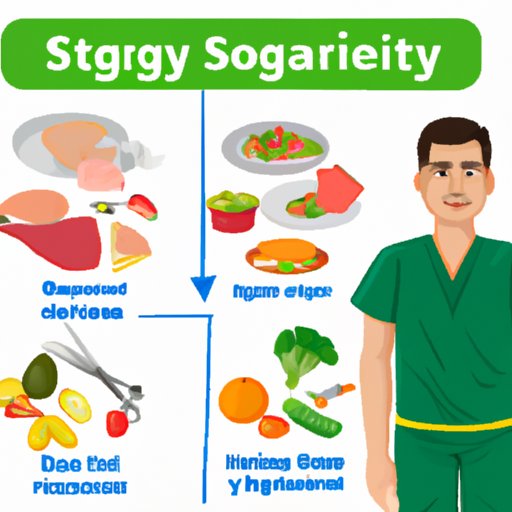
I. Introduction
Gastric sleeve surgery, also known as sleeve gastrectomy, is a type of bariatric surgery that involves removing a portion of the stomach to create a smaller stomach pouch. This procedure is meant to help individuals with obesity achieve significant weight loss and lead healthier lives. However, following post-surgery guidelines is crucial for long-term success, especially when transitioning from liquids to solids. In this article, we will explore the dangers of eating solids too soon after gastric sleeve surgery, the consequences of disregarding post-surgery guidelines, and how to safely transition to solid foods while maintaining a healthy diet.
II. The Risks and Consequences of Eating Solid Foods After Gastric Sleeve Surgery
Eating solid foods too soon after gastric sleeve surgery can lead to serious complications and health issues. The stomach needs time to heal and adjust to its new size, and introducing solid foods too soon can cause stretching, tears, and leaks. Additionally, solid foods require more digestive effort compared to liquids, and the stomach may not be able to handle it, leading to nausea, vomiting, and pain. Some specific examples of what can go wrong include:
- Stomach stretching, which can cause the stomach to return to its original size and lead to weight gain or even the need for additional surgeries.
- Food intolerance or sensitivity, leading to discomfort, gastrointestinal symptoms, and nutritional deficiencies.
- Bloating, indigestion, and heartburn due to difficulty digesting solid foods.
III. The Effects of Breaking Post-Surgery Guidelines and Eating Solid Foods After Gastric Sleeve Surgery
Disregarding post-surgery guidelines can have serious consequences for your health and weight loss goals. Patients who start eating solid foods too soon after gastric sleeve surgery risk stretching their stomach pouch, which can lead to weight regain or even surgery revision. Moreover, ignoring dietary recommendations can lead to nutritional deficiencies, dehydration, and metabolic disorders. Some personal experiences of patients who broke guidelines and suffered consequences include:
- Weight regain due to the stomach returning to its original size or overeating.
- Complications requiring additional medical interventions, such as surgery to repair a leak or band the stomach.
- Prolonged digestive issues, food intolerances, or malnutrition due to a lack of nutrients or incorrect dieting habits.
IV. How to Properly Transition from Liquids to Solids After Gastric Sleeve Surgery
As a general rule of thumb, patients should not eat solid foods until they are cleared by their healthcare professional or nutritionist. According to the American Society for Metabolic and Bariatric Surgery (ASMBS), patients should start transitioning to solid foods around four to six weeks post-surgery, depending on individual progress and tolerance.
When transitioning to solids, it is essential to start slowly and gradually increase the amount and texture of food while avoiding foods that are hard to digest. The ASMBS recommends the following timeline:
- Week 4: Soft and pureed foods, such as scrambled eggs, mashed potatoes, and pureed vegetables.
- Week 5: Ground or finely chopped foods, such as ground meat, fish, and cooked vegetables.
- Week 6: Regular-textured foods, such as chicken breast, grilled vegetables, and fruits.
It is also important to chew food slowly and thoroughly, eat small portions, and avoid drinking with meals.
V. The Importance of Following a Healthy Diet Plan After Gastric Sleeve Surgery
Proper nutrition is crucial for the success of gastric sleeve surgery. Patients should aim to eat a well-balanced diet that is high in protein, low in fat, and moderate in carbohydrates and fiber. Protein is particularly vital because it helps preserve muscle mass, supports wound healing, and minimizes hair loss. Some examples of healthy foods to eat include:
- Lean protein sources, such as chicken, turkey, fish, eggs, and tofu.
- Low-fat dairy products, such as milk, yogurt, and cheese.
- Vegetables and fruits, especially those that are non-starchy and high in fiber and vitamins.
- Whole grains, such as brown rice, quinoa, and whole wheat bread and pasta.
On the other hand, it is essential to avoid foods that are high in sugar, fat, and calories, as well as alcohol and carbonated beverages.
VI. What to Expect When Returning to Solid Foods After Gastric Sleeve Surgery
Returning to solid foods after a long period of liquids can be a challenging and overwhelming experience. It is normal to experience physical and emotional changes, such as taste aversions, food intolerances, and cravings. Patients may also feel anxious or guilty about eating solids again, especially if they associate them with past unhealthy eating habits.
Strategies for coping with these changes include seeking support from a healthcare professional or therapist, finding alternative ways to manage negative emotions, practicing mindful eating, and experimenting with new healthy recipes and flavors.
VII. Tips and Strategies for Overcoming the Desire to Eat Solid Foods After Gastric Sleeve Surgery
It is common for patients to experience cravings for solid foods after gastric sleeve surgery, especially if they had a diet high in processed foods before surgery. However, giving in to these cravings can compromise their weight loss and health goals. Some healthy alternatives to solid foods include:
- Protein shakes or smoothies made with low-fat dairy or protein powder.
- Sugar-free gelatin or pudding.
- Sugar-free popsicles or ice cream.
- Soups or broths, such as chicken broth or tomato soup.
Other strategies for overcoming the desire to eat solid foods include keeping a food diary, meal planning, and practicing healthy stress management techniques, such as exercise and meditation.
VIII. Conclusion
Gastric sleeve surgery can be a life-changing procedure, but it requires discipline and commitment to follow post-surgery guidelines. Eating solid foods too soon after gastric sleeve surgery can lead to serious consequences, including weight regain, digestive problems, and nutritional deficiencies. Patients should work closely with their healthcare team to transition to solid foods gradually and maintain a healthy, balanced diet that meets their needs. By following these guidelines and strategies, patients can achieve long-term success and improved quality of life.





